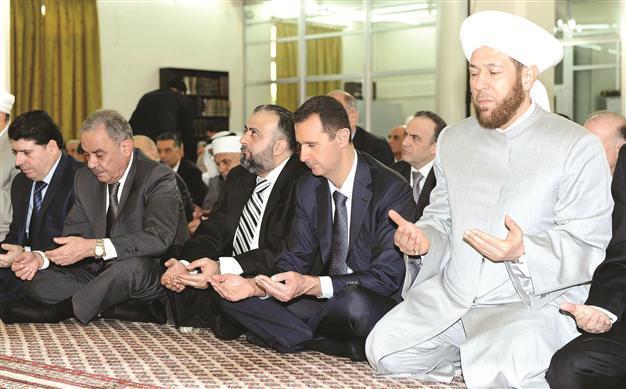Syrian president makes rare public appearance
DAMASCUS

Syrian President al-Assad (2-R) is seen with Syrian Mufti Ahmad Hassoun (R) and other top officials at mosque in Damascus. EPA Photo
Syrian President Bashar al-
Assad made a rare public appearance yesterday for prayers marking the end of Ramadan but activists said his forces were pressing on with a blitz of rebel areas.
Al-Assad joined prayers at a Damascus mosque for the Eid al-Fitr (Şeker Bayram) holiday, his first appearance in a public place since a bomb blast last month killed four top security officials, although he has been seen on television since then. Across the country, Syrians joined prayers and staged demonstrations for Eid, taking place for a second year under the shadow of an unrelenting conflict.
Despite the holiday, government forces pounded several rebel strongholds, including the main northern battleground of Aleppo, a watchdog said, on the day U.N. observers were winding up their troubled mission. A girl and a boy were among the nine people killed, the Syrian Observatory for Human Rights said. It also reported at least 137 deaths Aug. 18, and said 42 bodies had been dumped in al-Tal town in Damascus province.
Sandbags on the window“We put sandbags on the windows before we started praying, in case the army shelled the mosque,” said an activist in the old city of Homs in central
Syria, who identified himself as Abu Bilal.
“Syria will triumph against the Western-American plot being supported by the Wahhabis and takfiris [Sunni Muslim religious hardliners],” declared the imam at the al-Hamad Mosque, where a smiling al-Assad joined the prayers along with top regime officials, according to Agence France-Presse. “Our enemies among the Americans, the Zionists and their agents should be rejoicing to see us killing each other and sowing discord among us,” Sheikh Mohammed Kheir Ghantus said.
Amid Western speculation that more top officials were ready to abandon al-Assad, Syrian state television insisted that Vice President Faruk al-Shara had not left the country after opposition and media reports that he had defected. A former deputy oil minister who defected in March said Shara was actually under house arrest and that other top officials were also being kept under surveillance.
Syrians also protested in many other parts of the country, demanding freedom and the ouster of the regime. The new U.N. special envoy to Syria admitted he faces a difficult job trying to broker peace in Syria and said his first task is overcoming the divisions within the Security Council that stymied the efforts of his predecessor, The Associated Press reported.
Lakhdar Brahimi, who was named Aug. 17 to replace former U.N. Secretary-General Kofi Annan as peace envoy to Syria, has said getting the Security Council to speak “with a unified voice” is critical to his mission’s success, but that he has no concrete ideas on how to achieve that.
